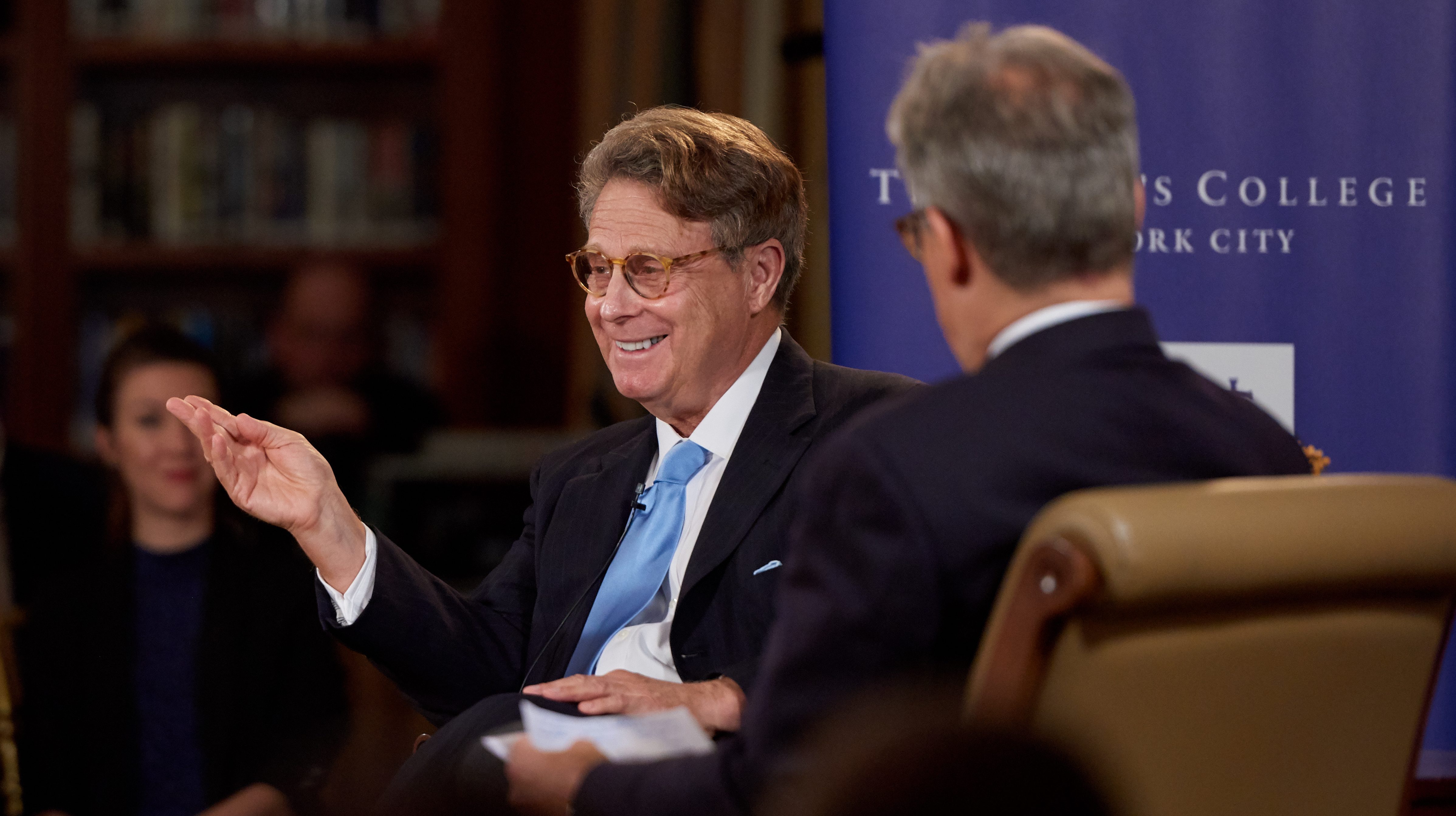An Evening with Novelist Mark Helprin
On the ultimate questions of life, Helprin said, “The best thing you can do is to embody the classical virtues, and to seek God whatever way you can.”

On October 10, The King’s College and Socrates in the City co-hosted an evening with Mark Helprin, author of Winter’s Tale and many other novels, short stories, and essays. Hosted at the Princeton Club in New York City, the event featured a conversation between Helprin and Socrates in the City founder Eric Metaxas as well as a reception and book signing. Notable guests included Colonel Chris Sussingham, chief test pilot for the F-16, and Tammy Jo Shults, the Southwest Airlines pilot who safely landed a plane with a failed engine this April.
Metaxas opened the evening’s discussion with an introduction of Helprin, praising him as a “rare genius” belonging to the “highest rank of writers in our time.” The interview centered around the sources of the moral vision of Helprin’s fiction. To each question, Helprin answered with references to other writers and generous anecdotes from his personal life.
To the question, “What is the meaning of life?” Helprin paraphrased Raymond Carver: “What we talk about when we talk about dying well is living well. One should be able to die well because it will come faster than you imagine.” Winston Churchill once said that life is like surfacing from the ocean on a raft for a few moments before going underwater again, Helprin said, with the ocean eternity past and future. To live well, “you need to have some knowledge of the eternity on either side of you.”
Metaxas asked about the origin of the “fierce moral quality,” the “sense of justice and injustice,” that shows through in Helprin’s novels. Helprin told about the formative influence of his father, Morris, who was first in his class at Columbia University. “My father was the most extraordinary man,” Helprin said. With a photographic memory, Morris was trained to break into and out of high-security areas to report the precise details of German military bases back to U.S. intelligence. From Morris, Helprin gained the conviction to “do what is right no matter the consequences.” This conviction carried Helprin through his protection duties for former President Barack Obama, in which he was determined to honor the presidential office despite the risks of his role and his ideological differences with the president.
Helprin said his moral sense is also connected to his Jewish faith, which he came to on his own though he is ethnically Jewish. In the Hasidic tradition, “You have a direct connection to God. You have to study, too, but there is not the formal mediation of other forms of Judaism,” Helprin said. “You can experience it right at the well.”
Through the course of the evening, Helprin touched on the reasons for his involvement in the Israeli Infantry and Air Force. Once, as a student at Harvard, he was writing a story in Cambridge Cemetery at the graves of William and Henry James while a funeral was being conducted. “Who is being buried?” Helprin asked. The answer: a boy his age who had been killed in Vietnam.
This experience shook Helprin and caused him to want to enlist. His personal disapproval of the Vietnam War didn’t matter—he wanted to do his duty. Helprin had already avoided the draft by being categorized as “4-F,” so joining the American efforts now was out of the question. But the Israeli armed forces would take him, and Helprin was determined to do his part to prevent another Holocaust.
In the evening’s introduction, Metaxas said that when he first encountered Helprin he was stunned that Helprin “seemed to take the concept of God seriously and seemed to be politically conservative.” This theme resurfaced as Helprin shared his perspectives on conscience and human fallibility. For a literary figure, Helprin’s convictions are uncommon, Metaxas said. “You’re parting company with most people who create art in our time.”
Helprin has said of himself that he belongs to no literary school, movement, tendency, or trend. Yet in conversation about the ultimate questions of life, he was willing to claim allegiance to what he recognizes as an unpopular belief: “The best thing you can do is to embody the classical virtues, and to seek God whatever way you can.”




